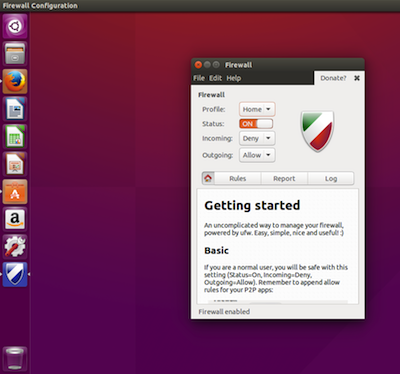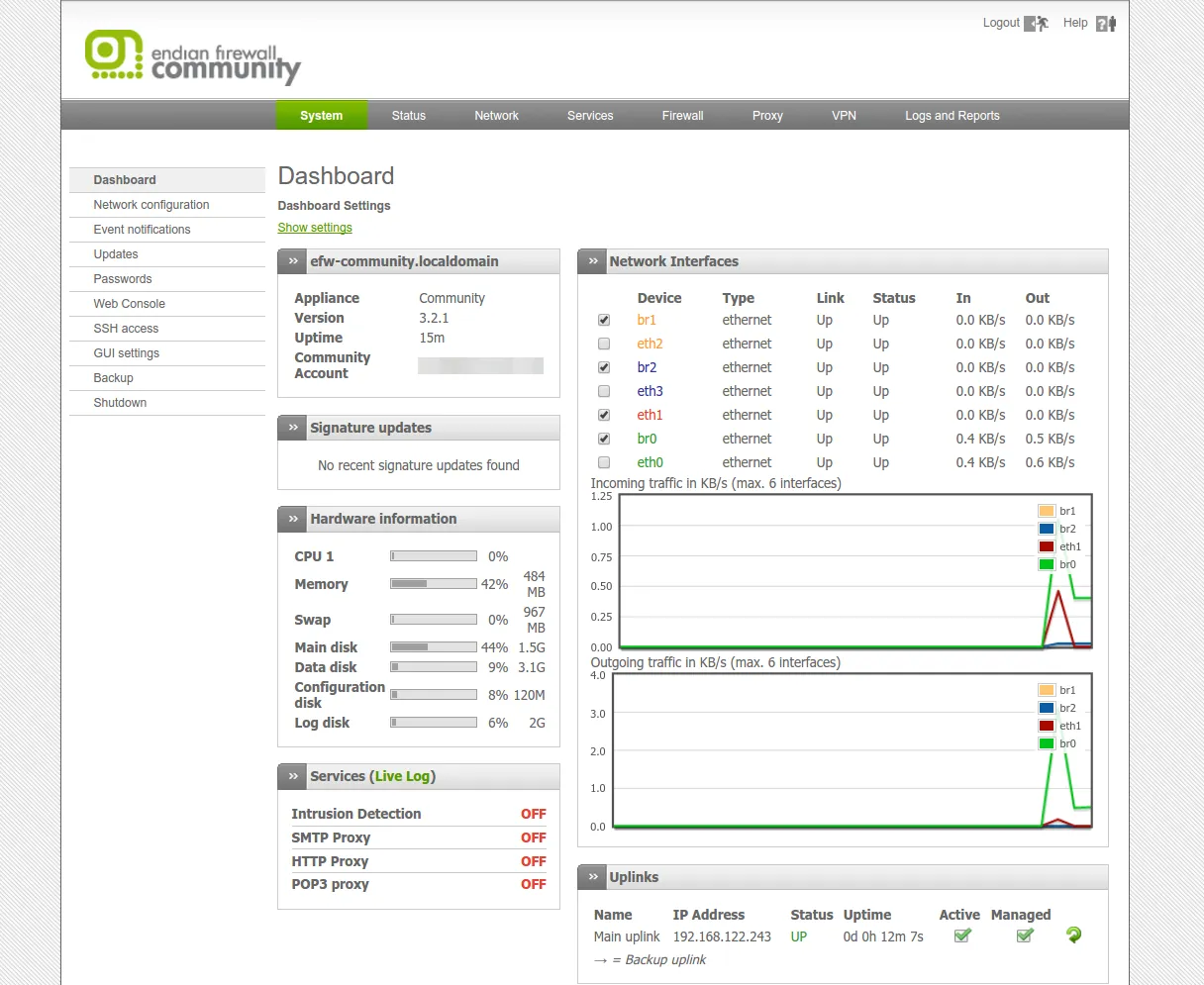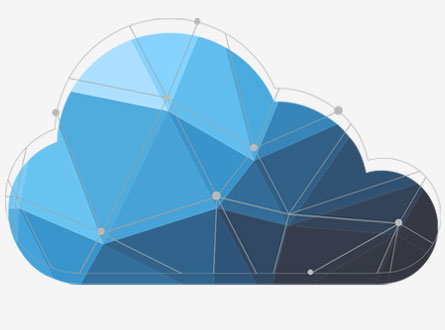Top 12 Free Firewall Software to Safeguard Your Network in 2024
Table of Content
A firewall is a network security system that monitors and controls incoming and outgoing network traffic based on predefined security rules.
It acts as a barrier between a trusted internal network and untrusted external networks, such as the internet.
Benefits for Enterprise Security and Network Security
- Monitors Network Traffic: Firewalls analyze data packets entering and leaving the network, ensuring only safe traffic passes through.
- Prevents Virus Attacks: They block malicious software and viruses from infiltrating the network.
- Blocks Unauthorized Access: Firewalls prevent hackers from accessing sensitive data and systems.
- Stops Spyware: They protect against spyware and malware that can steal data or control systems.
- Promotes Privacy: By securing data, firewalls help maintain privacy and build trust with clients.
- Enhances Compliance: Firewalls help businesses adhere to regulatory requirements by securing data and monitoring access.

In the following list, we offer the best open-source free firewall solutions for enterprise. Some of them are a community edition of an enterprise solution.
1- Shorewall
Shorewall is a free and open-source gateway/firewall configuration tool for GNU/Linux. It is released under the GPL-2.0 License.
Sure! Here are some key features of Shorewall:
- Stateful Packet Filtering: Utilizes Netfilter’s connection tracking for stateful packet filtering.
- Customizable Configuration: Completely customizable using configuration files.
- Unlimited Network Interfaces: No limit on the number of network interfaces.
- Network Zoning: Allows partitioning of the network into zones with complete control over connections between zones1.
- Centralized Administration: Supports centralized firewall administration1.
- Multiple ISP Support: Handles multiple Internet links from the same firewall/gateway.
- VPN Support: Supports IPsec, GRE, IPIP, OpenVPN tunnels, and PPTP clients and servers.
- Traffic Control: Includes support for traffic control and shaping.
- IPv6 Support: Capable of creating both IPv4 and IPv6 firewalls.
- Virtualization Support: Compatible with various virtualization solutions like KVM, Xen, Linux-Vserver, OpenVZ, VirtualBox, LXC, and Docker.
- Dozens of other features here.

2- OPNsense
OPNsense is an open-source firewall and routing platform based on FreeBSD. It offers a wide range of features typically found in commercial firewalls, providing robust security and ease of use.
Features:
- Stateful Firewall: Supports IPv4 and IPv6 with live traffic view.
- Multi WAN: Load balancing and failover support.
- VPN Support: Integrated IPsec, OpenVPN, Tinc, and WireGuard.
- Hardware Failover: Seamless failover with state synchronization using CARP.
- SD-WAN: Easy setup and monitoring with ZeroTier plugin.
- Intrusion Detection & Prevention: Inline prevention with Suricata and Emerging Threats rules.
- Two-Factor Authentication: Supported throughout the system.
- Routing Protocols: OSPF and BGP support via Free Range Router project.
- Traffic Shaping: Enhances network performance and prioritizes traffic.
- Captive Portal: Voucher support for guest access.
- Proxy & Web Filtering: Includes forward caching proxy and category-based web filtering.
- Netflow: Built-in reporting and monitoring tools.

3. UFW (Uncomplicated Firewall)
UFW (Uncomplicated Firewall) is a user-friendly firewall management tool for Linux systems, designed to simplify the complex iptables interface. It provides an easy-to-use command-line interface and is particularly popular among Ubuntu and Debian users.
Features
- Simple Command-Line Interface: Easy to use with basic commands like allow and deny.
- IPv4 and IPv6 Support: Handles both IPv4 and IPv6 traffic.
- Default Deny Policy: Blocks all incoming connections by default, allowing only specified traffic.
- Logging: Provides logging capabilities to monitor firewall activity.
- Rate Limiting: Helps prevent brute-force attacks by limiting the number of connections.
- Application Integration: Allows rules to be set based on application profiles.
- GUI Frontend (Gufw): Offers a graphical interface for those who prefer not to use the command line.
- Extensible Framework: Can be extended with additional rules and configurations.
- Filtering by Interface: Supports filtering traffic based on network interfaces.
- Per-Rule Logging: Enables logging for specific rules.

4. Endian Firewall Community

Endian Firewall Community (EFW) is a turn-key Linux-based security distribution that transforms any hardware into a full-featured Unified Threat Management (UTM) solution.
Endian Firewall Features
- Stateful Firewall: Protects against internet threats while managing internal and external network access.
- VPN (SSL & IPsec): Provides secure remote access and connects multiple offices.
- Email Security: Filters out spam, phishing, and other malicious emails.
- Antivirus: Detects and prevents infections for both web and email traffic.
- Intrusion Prevention (IPS): Analyzes traffic flows to protect against internal and external threats.
- Live Network Monitoring and Reporting
- Multi-WAN with Failover: Enhances reliability by connecting multiple internet connections.
- Quality of Service (QoS): Manages bandwidth utilization and prioritizes critical applications.
- Reporting: Offers real-time and historical reports on network traffic.

5. pfSense
pfSense is a free, open-source firewall and router platform based on FreeBSD. It provides comprehensive network security solutions for enterprises, businesses, and home offices.
Features:
- Stateful Firewall: Monitors and filters incoming and outgoing network traffic.
- VPN Support: Includes IPsec, OpenVPN, and PPTP for secure remote access.
- Load Balancing: Distributes network traffic across multiple WAN connections.
- Multi-WAN: Supports multiple internet connections for redundancy and failover.
- Traffic Shaping: Manages bandwidth and prioritizes critical applications.
- Captive Portal: Controls access to the network with authentication.
- Intrusion Detection and Prevention: Protects against network threats using Snort.
- Dynamic DNS: Automatically updates DNS records when IP addresses change.
- Web Interface: User-friendly web-based management interface.
- Cloud Integration: Available on AWS and Azure for cloud deployments.

6. Smoothwall Express

Smoothwall is a best-of-breed Internet firewall/router, designed to run on commodity hardware and to provide an easy-to-use administration interface to those using it. Built using open source and Free software, it's distributed under the GNU Public License.
It works on Windows and BSD.
7. Iptables
Iptables is a command-line utility for configuring the Linux kernel firewall. It allows administrators to define rules for filtering network traffic, providing robust security for Linux systems.
Features of Iptables:
- Packet Filtering: Controls incoming and outgoing network traffic based on predefined rules.
- NAT (Network Address Translation): Modifies network address information in packet headers for routing.
- Logging: Records details about network traffic for monitoring and troubleshooting.
- Custom Rules: Allows creation of specific rules to accept, reject, or drop packets.
- Chain Management: Organizes rules into chains for different types of traffic (e.g., INPUT, OUTPUT, FORWARD).
- Stateful Inspection: Tracks the state of network connections to make more informed filtering decisions.
- Extensibility: Supports additional modules for enhanced functionality.
8. CSF (ConfigServer Security & Firewall)
ConfigServer Security & Firewall (CSF) is a popular and powerful firewall solution for Linux servers.
Features
- Straight-forward SPI iptables firewall script
- Daemon process that checks for login authentication failures for:
- Courier imap, Dovecot, uw-imap, Kerio
- openSSH
- cPanel, WHM, Webmail (cPanel servers only)
- Pure-ftpd, vsftpd, Proftpd
- Password protected web pages (htpasswd)
- Mod_security failures (v1 and v2)
- Suhosin failures
- Exim SMTP AUTH
- Custom login failures with separate log file and regular expression matching
- POP3/IMAP login tracking to enforce logins per hour
- SSH login notification
- SU login notification
- Excessive connection blocking
- UI Integration for cPanel, DirectAdmin, InterWorx, CentOS Web Panel (CWP), VestaCP, CyberPanel - and Webmin
- Easy upgrade between versions from within the control panel
- Easy upgrade between versions from shell
- Pre-configured to work on a cPanel server with all the standard cPanel ports open
- Pre-configured to work on a DirectAdmin server with all the standard DirectAdmin ports open
- Auto-configures the SSH port if it’s non-standard on installation
- Block traffic on unused server IP addresses – helps reduce the risk to your server
- Alert when end-user scripts sending excessive emails per hour – for identifying spamming scripts
- Suspicious process reporting – reports potential exploits running on the server
- Excessive user processes reporting
- Excessive user process usage reporting and optional termination
- Suspicious file reporting – reports potential exploit files in /tmp and similar directories
- Directory and file watching – reports if a watched directory or a file changes
- Block traffic on a variety of Block Lists including DShield Block List and Spamhaus DROP List
- BOGON packet protection
- Pre-configured settings for Low, Medium or High firewall security (cPanel servers only)
- Works with multiple ethernet devices
- Server Security Check – Performs a basic security and settings check on the server (via cPanel/- DirectAdmin/Webmin UI)
- Allow Dynamic DNS IP addresses – always allow your IP address even if it changes whenever you connect to the internet
- Alert sent if server load average remains high for a specified length of time
- mod_security log reporting (if installed)
- Email relay tracking – tracks all email sent through the server and issues alerts for excessive usage (cPanel servers only)
- IDS (Intrusion Detection System) – the last line of detection alerts you to changes to system and application binaries
- SYN Flood protection
- Ping of death protection
- Port Scan tracking and blocking
- Permanent and Temporary (with TTL) IP blocking
- Exploit checks
- Account modification tracking – sends alerts if an account entry is modified, e.g. if the password is changed or the login shell
- Shared syslog aware
- Messenger Service – Allows you to redirect connection requests from blocked IP addresses to preconfigured text and html pages to inform the visitor that they have been blocked in the firewall. This can be particularly useful for those with a large user base and help process support requests more efficiently
- Country Code blocking – Allows you to deny or allow access by ISO Country Code
- Port Flooding Detection – Per IP, per Port connection flooding detection and mitigation to help block DOS attacks
- WHM root access notification (cPanel servers only)
- lfd Clustering – allows IP address blocks to be automatically propagated around a group of servers running lfd. It allows allows cluster-wide allows, removals and configuration changes
- Quick start csf – deferred startup by lfd for servers with large block and/or allow lists
- Distributed Login Failure Attack detection
- Temporary IP allows (with TTL)
- IPv6 Support with ip6tables
- Integrated UI – no need for a separate Control Panel or Apache to use the csf configuration
- Integrated support for cse within the Integrated UI
- cPanel Reseller access to per reseller configurable options Unblock, Deny, Allow and Search IP address blocks
- System Statistics – Basic graphs showing the performance of the server, e.g. Load Averages, CPU Usage, Memory Usage, etc
- ipset support for large IP lists
- Integrated with the CloudFlare Firewall
9. FirewallD
Firewalld is a firewall management tool for Linux operating systems, serving as a front-end for the Linux kernel’s netfilter framework. The current default backend for firewalld is nftables, while iptables was the default backend before version 0.6.0.
Features
- Dynamic Management: Supports runtime and permanent configurations without needing to restart the service.
- Network Zones: Defines different trust levels for network connections or interfaces.
- IPv4 and IPv6 Support: Manages firewall settings for both IPv4 and IPv6.
- NAT (Network Address Translation): Provides NAT support for IPv4 and IPv6.
- D-Bus API: Offers a complete D-Bus API for easy integration with services and applications.
- Rich Language: Allows for complex and flexible rule definitions.
- Timed Rules: Enables temporary firewall rules that expire after a set time.
- Logging: Logs denied packets for monitoring and troubleshooting.
- Lockdown Mode: Whitelists applications that are allowed to modify the firewall.
- Timed firewall rules in zones
- Simple log of denied packets
- Direct interface
- Lockdown: Whitelisting of applications that may modify the firewall
- Automatic loading of Linux kernel modules
- Integration with Puppet
- Command line clients for online and offline configuration
- Graphical configuration tool using gtk3
- GUI Applet using Qt5
Supported systems for Firewalld
- RHL 7
- CentOS
- Fedora 18+
- SUSE 15 +
- openSUSE 15 +
- Ubuntu
- Debian
- Arch Linux

10. VyOS
VyOS is an open-source network operating system that provides advanced routing, firewall, and VPN capabilities. It is designed to be a versatile and customizable platform for network devices, suitable for various environments including data centers, cloud infrastructures, and enterprise networks.
Features
- Routing: Supports BGP (IPv4 and IPv6), OSPF (v2 and v3), RIP (v1 & v2), RIPng, IS-IS, policy-based routing, and multicast routing.
- VPN and Tunneling: Includes IPsec, VTI, VXLAN, L2TPv3, L2TP/IPsec, PPTP servers, GRE, IPIP, SIT tunnel interfaces, OpenVPN, and WireGuard.
- Firewall and NAT: Offers stateful firewall, zone-based firewall, and various types of source and destination NAT.
- Core Network Services: Provides DHCP and DHCPv6 server and relay, IPv6 RA, DNS forwarding, TFTP server, web proxy, PPPoE access concentrator, and NetFlow/sFlow sensor.
- High Availability: Features VRRP for IPv4 and IPv6, ECMP, and stateful load balancing.
- Automation-Friendly: Supports API (GraphQL), configuration management tools (Ansible, Salt, Netmiko, NAPALM, Terraform), Cloud-init, and scripting API for Shell and Python.
- Customizable Images: Allows for custom package sources, additional packages, and custom default configuration files.
- RESTful OpenAPI
11. IPFire
IPFire is an open-source Linux distribution designed primarily as a firewall and router. It offers robust security features and is managed through a web-based interface.
Features
- Stateful Packet Inspection: Analyzes traffic for threats in real-time.
- Network Segmentation: Separates networks into different security zones (e.g., LAN, DMZ, Wi-Fi).
- Intrusion Prevention System (IPS): Detects and prevents network intrusions.
- VPN Support: Includes IPsec and OpenVPN for secure remote connections.
- Web Proxy: Provides caching and URL filtering.
- Quality of Service (QoS): Manages bandwidth to prioritize critical traffic.
- Logging and Reporting: Offers detailed logs and real-time graphs for monitoring.

12. ClearOS
ClearOS is an open-source operating system designed for server, network, and gateway systems. It is suitable for homes, small to medium businesses, and distributed environments.
Features of ClearOS:
- Firewall: Stateful packet inspection for enhanced security.
- VPN: Supports IPsec, PPTP, and OpenVPN for secure remote access.
- Web Proxy: Includes content filtering and antivirus.
- Intrusion Detection and Prevention: Uses SNORT for network security.
- Email Services: Provides webmail, SMTP, POP3, and IMAP.
- File and Print Services: Supports Samba and CUPS.
- Database and Web Server: Easy deployment of LAMP stack.
- MultiWAN: Ensures internet fault tolerance.
- It comes with a rich marketplace that contains 100+ security apps.



















